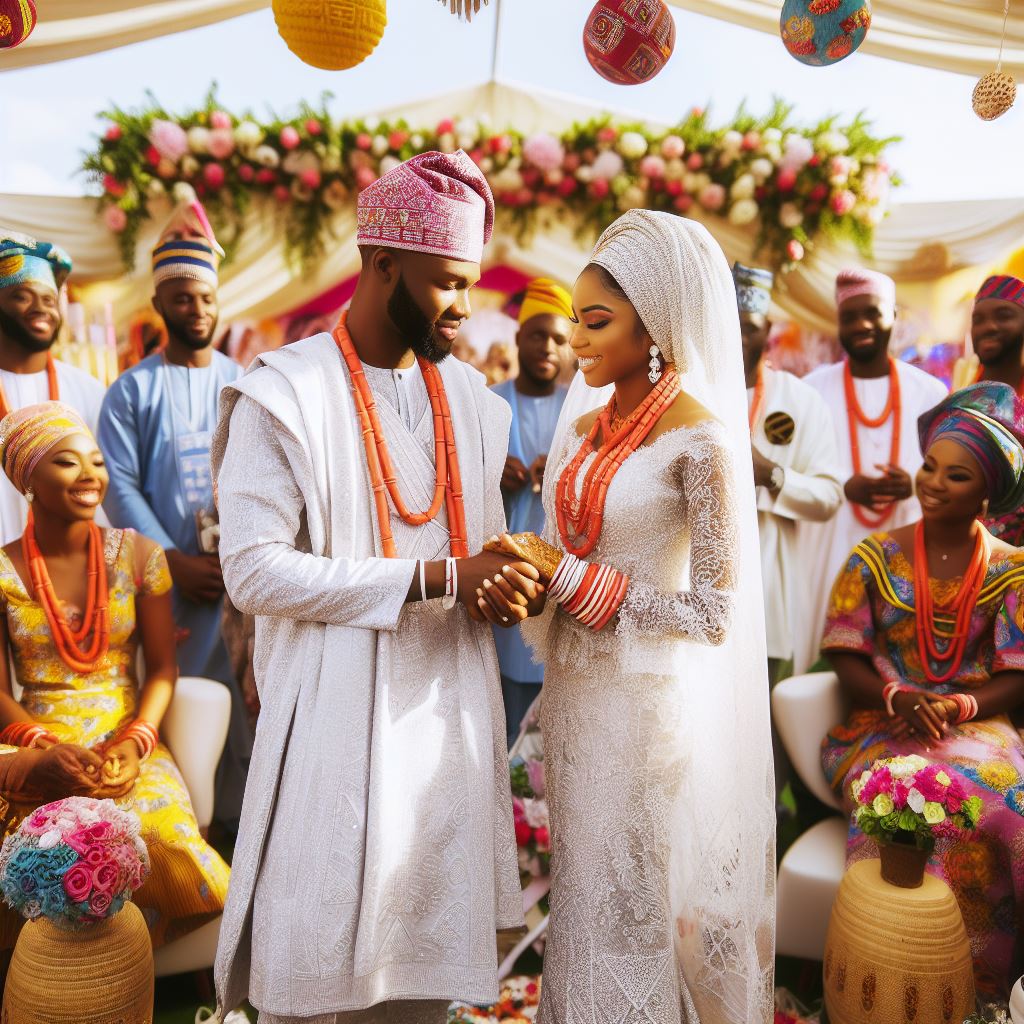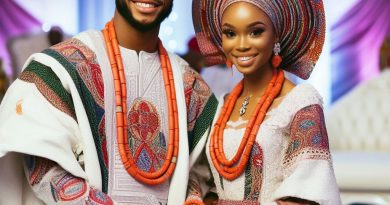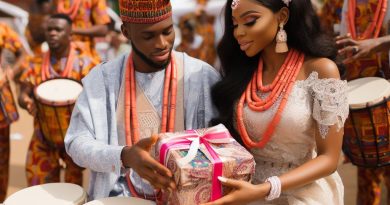What Expatriates Need to Know About Marrying in Nigeria
Last Updated on October 18, 2023
Introduction
The topic of marrying in Nigeria for expatriates
Marrying in Nigeria can be a complex process for expatriates.
Importance of understanding the cultural and legal aspects of marriage in Nigeria
It is crucial to comprehend both the cultural and legal aspects of marriage in Nigeria to navigate this unfamiliar territory successfully.
Introduction:
- Cultural Mosaic: Marrying in Nigeria unveils a rich tapestry of cultures, a journey beyond the ordinary.
- Guiding Expatriates: A compass for expatriates navigating the labyrinth of Nigerian matrimonial traditions.
Understanding Cultural Aspects:
- Ceremonial Diversity: Nigeria’s myriad ethnic groups bring diverse wedding traditions, each a cultural treasure.
- Family Bonds: Recognize the significance of familial ties, often playing a central role in marital unions.
- Attire Etiquette: Understanding the cultural nuances of wedding attire showcases respect for local traditions.
Navigating Legal Dimensions:
- Documentation Demands: Comprehend the paperwork maze; legal requirements demand meticulous attention.
- Customary vs. Civil: Recognize the dual marriage systems—customary and civil—each with distinct legal implications.
- Polygamy Provisions: Acknowledge legal provisions on polygamous unions, which vary across regions.
Importance of Cultural and Legal Awareness:
- Harmonizing Traditions: Marrying successfully involves blending expatriate backgrounds with local customs, fostering cultural harmony.
- Legal Safeguards: Understanding legal intricacies safeguards expatriates against unintentional legal complications in marital matters.
Embarking on matrimonial ventures in Nigeria as an expatriate demands more than love—it requires cultural appreciation and legal astuteness.
This chapter serves as your guide through the intricate dance of tradition and law, ensuring a harmonious marriage journey.
Cultural Perspective
In Nigerian culture, marriage is not just a union between two individuals, but between two families.
Traditional Nigerian beliefs and customs surrounding marriage
- Marriage is seen as a sacred institution and a crucial part of Nigerian culture.
- It is believed that marriages are predestined by a higher power.
- Parents and elders play a significant role in selecting a suitable partner.
- Marriage is viewed as a way to continue one’s lineage and ensure family unity.
- Religious beliefs often influence the practices and rituals associated with Nigerian marriages.
The significance of dowry and its role in Nigerian marriages
- The dowry, known as “bride price,” is an essential aspect of Nigerian marriages.
- It is a payment made by the groom to the bride’s family as a sign of respect and appreciation.
- The dowry can consist of money, livestock, or other valuable goods.
- It serves as a symbol of the groom’s ability to provide for his future wife.
- The amount of the dowry can vary depending on factors such as the bride’s social status and the groom’s financial situation.
- Not fulfilling the payment of the agreed dowry can lead to conflicts and even the dissolution of the marriage.
The importance of extended family and community involvement in Nigerian marriages
- In Nigeria, marriages are not just a union between two individuals; they involve the entire extended family.
- Family members have a say in the selection of a partner and the overall marriage process.
- Extended family members often provide support and guidance to couples throughout their married life.
- Community involvement is also crucial, as marriages are seen as a way to strengthen social ties.
- Weddings in Nigeria are typically large celebrations that bring the entire community together.
- Support from both extended family and the community helps in cultivating a strong support system for the couple.
Understanding and respecting the cultural perspective of Nigerian marriages is essential for expatriates planning to marry in Nigeria.
It is crucial to engage with the local customs, traditions, and beliefs surrounding marriage to ensure a successful and harmonious union.
Read: Protecting Assets & Legacies: Ordinance Marriage in Nigeria
Legal Requirements
Legal Requirements for Getting Married in Nigeria as an Expatriate
Getting married as an expatriate in Nigeria requires fulfilling certain legal requirements. These requirements are essential to ensure that the marriage is recognized and legally valid in the country.
Obtaining a Marriage License and Registration
The process of obtaining a marriage license and registration in Nigeria is relatively straightforward. Expatriates need to follow these steps to formalize their marriage:
Contact the local marriage registry
Expatriates should reach out to the local marriage registry in the state where they intend to marry. The registry will provide them with the necessary guidelines and requirements.
Submit the required documents
Expatriates need to provide specific documentation to obtain a marriage license. These documents typically include valid passports, birth certificates, and proof of single status.
It is crucial to check with the local registry for any additional requirements.
Attend a marriage counseling session
In Nigeria, it is a legal requirement for couples to attend a marriage counseling session. This session aims to provide guidance on marital responsibilities and lays a foundation for a successful union.
Pay the marriage registration fee
Expatriates should be prepared to pay a marriage registration fee at the registry. This fee covers the cost of processing the marriage license and official documentation.
Have two witnesses present
During the marriage ceremony, it is necessary to have two witnesses who are of legal age and mentally sound. These witnesses will authenticate the marriage by signing the marriage certificate.
Receive the marriage certificate:
Once the ceremony is completed, the couple will be issued a marriage certificate. This document serves as proof of their union and should be stored in a safe place.
Specific Documentation for Expatriates
Expatriates planning to marry in Nigeria must provide some specific documentation, including:
- A valid passport: Expatriates should have a valid passport that is at least six months away from expiration. This document establishes their identity and nationality.
- Birth certificates: Both the bride and groom need to present their birth certificates as a vital piece of identification.
- Proof of single status: Expatriates might be required to provide evidence of their single status through an affidavit or a statement from their home country’s embassy or consulate.
- Deed poll or divorce papers (if applicable): If either party has been previously married, they must provide the deed poll or divorce papers as proof of the dissolution of the previous marriage.
Interfaith or Intercultural Marriages
Nigeria, being a diverse country, recognizes and respects interfaith and intercultural marriages. However, there are certain considerations and restrictions to take into account:
- Religious requirements: For interfaith marriages, it is important to consult with the religious traditions of both parties and obtain any necessary permissions or blessings.
- Cultural sensitivity: Interethnic or intercultural marriages should be approached with sensitivity to ensure mutual respect and understanding between families and communities.
By adhering to the legal requirements, obtaining the necessary documentation, and considering the nuances of interfaith or intercultural unions, expatriates can navigate the process of getting married in Nigeria seamlessly.
It is advisable to consult with local authorities or legal professionals for specific guidance based on individual circumstances.
Read: Challenges and Triumphs: Stories of Nigerian Married Couples

Marriage Ceremony in Nigeria
In Nigeria, a wedding ceremony is a lavish and festive affair filled with colors, traditions, and cultural significance.
It is a joyful celebration that brings together families, friends, and the community at large. Let us have a closer look at the various components that make up a typical Nigerian wedding ceremony.
1. The Traditional Engagement
- Before the wedding ceremony, there is usually a traditional engagement known as the introduction.
- This is a formal meeting between the two families where the groom’s family officially asks for the bride’s hand in marriage.
- It is an important step that signifies the commitment and acceptance of both families.
2. Traditional Wedding Ceremony
- The traditional wedding ceremony, also known as the traditional marriage, is a key component of Nigerian weddings.
- It is a colorful event that showcases the rich traditions and customs of various ethnic groups in Nigeria.
- During this ceremony, the bride and groom wear traditional attire, which differs depending on their ethnic background.
3. Significance of Religious and Cultural Rituals
- Religious and cultural rituals play a significant role in Nigerian weddings. Nigeria is a multi-religious country, with Christianity and Islam being the two main religions.
- These religious ceremonies are conducted in churches or mosques and are important for couples who follow specific religious beliefs.
- Furthermore, cultural rituals are deeply ingrained in Nigerian weddings. These rituals vary across different ethnic groups but often involve traditional dances, songs, prayers, and the exchange of symbolic items.
- They hold immense significance in the preservation of cultural heritage and are a way to honor ancestors and seek their blessings.
4. Unique Traditions and Customs
- Nigeria is a diverse country with more than 250 ethnic groups, each having its own unique wedding traditions and customs.
- Expatriates planning to marry in Nigeria need to be aware of these traditions and customs to ensure they respect and participate appropriately.
- For example, the Yoruba tribe has a traditional engagement ceremony called the “Introduction and Engagement” ceremony, which involves the groom presenting gifts to the bride’s family.
- The Igbo tribe, on the other hand, has the “Igba Nkwu” ceremony where the bride and groom exchange palm wine and share prayers and blessings.
- Additionally, it is common for guests to gift money, known as the “spraying of money,” to the couple during the wedding ceremony.
- This gesture is seen as a way to bless and support the newlyweds as they start their married life.
A Nigerian wedding ceremony is a vibrant and culturally rich event. It combines religious and cultural rituals that hold deep meaning for the couple and their families.
Expatriates marrying in Nigeria should embrace and respect these traditions, as they are an integral part of the country’s heritage.
By understanding and participating in the various components, expatriates can not only have a memorable wedding experience but also show appreciation for Nigerian culture and traditions.
Read: Dissolution of Marriage by Ordinance: Rights & Responsibilities
Marriage Laws and Rights
1. Rights and Responsibilities of Married Couples in Nigeria
- Married couples in Nigeria have the right to marry freely and consent to the marriage.
- They are entitled to live together and enjoy each other’s companionship.
- Both partners have the responsibility to provide love, care, and support for their spouse and children.
- They have the right to inherit from each other and have joint property ownership.
- Married couples also have the responsibility to be loyal and faithful to each other.
- They can make joint decisions on matters concerning their marriage, family, and children.
- Both partners have the right to participate equally in household and family affairs.
- They have the responsibility to provide for the financial well-being of the family.
- Married couples also have the right to access medical care and make decisions about their healthcare together.
- They have the responsibility to raise and educate their children in a loving and supportive environment.
2. Differences or Similarities between Nigerian Marriage Laws and Those of Other Countries
- In Nigeria, men can legally have multiple wives, a practice forbidden in many countries.
- Nigeria does not legally recognize or protect same-sex marriages, while some countries do
- Nigeria’s legal age for marriage is 18 years old, whereas it varies in different countries.
- The process of registering a marriage may differ slightly between Nigeria and other countries.
- In Nigeria, only the husband can initiate divorce, unlike many countries where either spouse can file for divorce
- Some countries have prenuptial agreements to protect assets in case of divorce, while Nigeria does not.
- There may be variations in the requirements for marriage ceremonies and documentation across different countries.
- The recognition of customary and religious marriages may differ between Nigeria and other countries.
- International couples may face challenges in navigating dual citizenship and immigration laws.
- Child custody and visitation rights may differ in Nigeria compared to other countries.
3. Legal Considerations for Divorce or Dissolution of Marriage in Nigeria for Expatriates
- Expatriates marrying in Nigeria should be familiar with the country’s divorce laws.
- For expatriates, divorce laws may vary depending on their home country and its jurisdiction.
- Expatriates should consult with a lawyer knowledgeable in Nigerian family law to understand their rights and obligations.
- The legal process for divorce in Nigeria involves filing a petition, providing evidence of marriage breakdown, and attending court hearings.
- Division of assets and custody of children are important considerations during divorce proceedings in Nigeria.
- Expatriates may need to navigate the complexities of resolving legal issues in two different jurisdictions.
- It is essential to gather all relevant documents and evidence to support one’s case during divorce proceedings.
- Mediation and alternative dispute resolution methods are available options for resolving marital disputes in Nigeria.
- Expatriates should seek legal advice before signing any separation or divorce agreements to protect their rights and interests.
- Understanding the process and legal consequences of divorce can help expatriates navigate this challenging transition.
In short, understanding Nigerian marriage laws and rights is crucial for expatriates planning to marry in Nigeria.
It is essential to be aware of the rights and responsibilities of married couples, any differences or similarities with other countries’ laws, and the legal considerations for divorce.
Seeking legal advice and familiarizing oneself with the legal procedures can help ensure a smooth and legally sound marriage journey in Nigeria.
Read: The Dynamics of Polygamous Marriages in Nigerian Culture
Conclusion
Recap the main points discussed in the blog post
Overall, it is crucial for expatriates who plan on marrying in Nigeria to fully understand the cultural and legal aspects of the process.
Importance of understanding the cultural and legal aspects of marrying in Nigeria as an expatriate
By familiarizing themselves with the customs and traditions, as well as the legal requirements and documentation needed, expatriates can ensure a successful marriage.
Encourage further research and seeking professional advice for a successful marriage in Nigeria
Highly recommend seeking professional advice and conducting thorough research to navigate Nigerian marriage complexities effectively
A well-informed approach is the key to a harmonious and fulfilling marriage in this vibrant African country.


